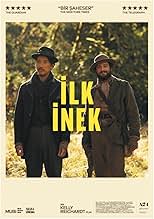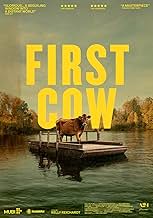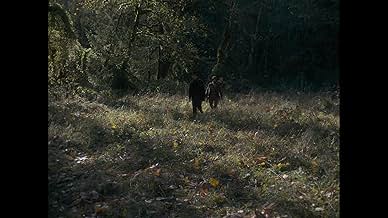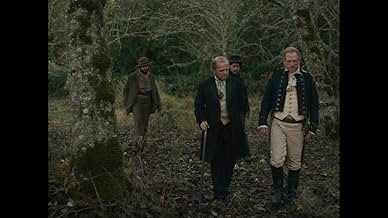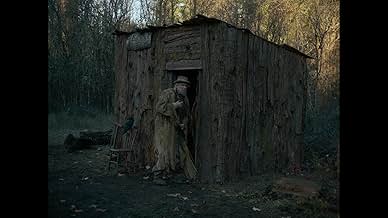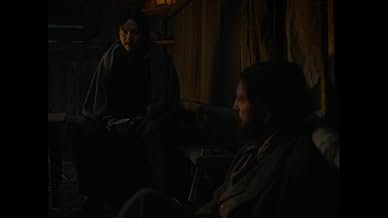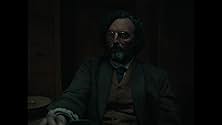ÉVALUATION IMDb
7,1/10
23 k
MA NOTE
Un cuisinier rejoint un groupe de trappeurs de fourrures dans l'Oregon, et forme un lien véritable avec un immigrant chinois qui cherche également à faire fortune. Bientôt, les deux hommes c... Tout lireUn cuisinier rejoint un groupe de trappeurs de fourrures dans l'Oregon, et forme un lien véritable avec un immigrant chinois qui cherche également à faire fortune. Bientôt, les deux hommes collaborent sur une entreprise prospère.Un cuisinier rejoint un groupe de trappeurs de fourrures dans l'Oregon, et forme un lien véritable avec un immigrant chinois qui cherche également à faire fortune. Bientôt, les deux hommes collaborent sur une entreprise prospère.
- Prix
- 21 victoires et 141 nominations au total
Rene Auberjonois
- Man with Raven
- (as René Aubergenois)
Kevin Michael Moore
- Fort Trapper
- (as Kevin-Michael Moore)
Avis en vedette
The film's visual style is impressive but it's story and pacing is what really drags this film down for me. The cinematography is the one aspect I found to be excellent. The framing is on point and impressive and it adds a lot to the film's style. The production design and costumes are also really good here too. These characters look and feel as if they in the 1820s. The performances are also great too. Each character feels believable and works to help tell the story of the film. Although I like all that, the pacing is not very good. It feels incredibly long and tedious without any real majorly satisfying payoff. It's a 2 hour movie that feels like it goes on for 2 and a half hours. If they had cut down some of the scenes, this issue wouldn't be as major as it is. There were some elements of the story I enjoyed and some I found to be pointless. If you like A24 then check it out but don't have your hopes incredibly high for it.
Half of the audience that watches this film will likely hate it. I'm starting with that because this film is incredibly slow in terms of pacing, which will easily turn off the impatient viewers. Personally, if a film like that has an interesting story, a slow pace actually helps to suck me into a story. First Cow, which is one of A24's most recent releases, has just become available on-demand. While I wouldn't rank it among their best when looking at their stellar catalog of films in recent years, it's still a great movie all around.
First Cow follows a highly skilled survivalist/cook in Cookie Figowitz (John Magaro), as he stumbles upon a group of traders. Becoming close friends with King-Lu (Orion Lee), they illegally take an opportunity to earn themselves a profit. Once a cow arrives on one of the farms, they steal milk in order to cook biscuits for the townspeople. All seems well and good, but they can only keep it a secret for so long. This premise held my attention so well because the film continuously gave you reasons to care about the two main characters. It was that, on top of the slow pace that really kept me invested.
Films like Meek's Cutoff and Night Moves are what had me keeping an eye on director Kelly Reichardt because I found those films showed her true potential as a filmmaker. She's wonderful at bringing out the best in all of her performers. What kept me from loving those two films overall though, was the fact that I found them to be a little too drab in terms of sound design and music. That's clearly her signature because First Cow once again feels a little too much like that. I loved watching this film and everything that happens felt earned and satisfying, but the overall movie can feel a little lifeless at times. That's really my only issue with most of her film that I've seen. She's otherwise an award-worthy filmmaker in my eyes.
Yes, John Magaro and Orion Lee are both terrific and hold this film together from start to finish, but the real star of the show here is cinematographer Christopher Blauvelt. Having worked on her two aforementioned films as well as a few others, his work on Don't Worry, He Won't Get Far on Foot and Mid90s is when his name truly jumped out at me. Blauvelt is someone that I will begin researching and anxiously awaiting his next project, simply due to the fact that his work on First Cow was his best yet. The camerawork felt like a character in its own right. From certain ways, characters are framed to extreme wide shots that clearly have deeper meanings, the way this film looks pulled me in more than anything else.
In the end, there are things about the tone that bothered me throughout the entire movie, but the story, characters, and especially the way the film is shot held my attention throughout. It's hard to recommend this movie to those who are casual viewers and were looking to be entertained because I can almost guarantee that you won't be unless you're a film buff and know what to expect. If it wasn't for the dour feel of the whole thing just not clicking with me, I might be saying that I loved this movie. Overall, it's a very, very well-made film that deserves attention, but from the proper audience.
First Cow follows a highly skilled survivalist/cook in Cookie Figowitz (John Magaro), as he stumbles upon a group of traders. Becoming close friends with King-Lu (Orion Lee), they illegally take an opportunity to earn themselves a profit. Once a cow arrives on one of the farms, they steal milk in order to cook biscuits for the townspeople. All seems well and good, but they can only keep it a secret for so long. This premise held my attention so well because the film continuously gave you reasons to care about the two main characters. It was that, on top of the slow pace that really kept me invested.
Films like Meek's Cutoff and Night Moves are what had me keeping an eye on director Kelly Reichardt because I found those films showed her true potential as a filmmaker. She's wonderful at bringing out the best in all of her performers. What kept me from loving those two films overall though, was the fact that I found them to be a little too drab in terms of sound design and music. That's clearly her signature because First Cow once again feels a little too much like that. I loved watching this film and everything that happens felt earned and satisfying, but the overall movie can feel a little lifeless at times. That's really my only issue with most of her film that I've seen. She's otherwise an award-worthy filmmaker in my eyes.
Yes, John Magaro and Orion Lee are both terrific and hold this film together from start to finish, but the real star of the show here is cinematographer Christopher Blauvelt. Having worked on her two aforementioned films as well as a few others, his work on Don't Worry, He Won't Get Far on Foot and Mid90s is when his name truly jumped out at me. Blauvelt is someone that I will begin researching and anxiously awaiting his next project, simply due to the fact that his work on First Cow was his best yet. The camerawork felt like a character in its own right. From certain ways, characters are framed to extreme wide shots that clearly have deeper meanings, the way this film looks pulled me in more than anything else.
In the end, there are things about the tone that bothered me throughout the entire movie, but the story, characters, and especially the way the film is shot held my attention throughout. It's hard to recommend this movie to those who are casual viewers and were looking to be entertained because I can almost guarantee that you won't be unless you're a film buff and know what to expect. If it wasn't for the dour feel of the whole thing just not clicking with me, I might be saying that I loved this movie. Overall, it's a very, very well-made film that deserves attention, but from the proper audience.
It may be because of how I watched this - First Cow and Reichardt's films in general call for seeing it in a cinema if at all possible, she simply has that eye and ear for the minutest details and for the time she takes with every shot and many scenes to draw out the feeling of a place as well as for the actors to settle in, that you want to sink in to this film as a sensory experience, and instead I saw it at home where (I don't know about you but) I have too many distractions, not least of which the phone on a busy weekday - but it took me about fifteen to twenty minutes or so to get into the mood of this film. I wasn't sure if it might go anywhere really, as it follows the Cookie character as he is part of this fur trapping outfit (or almost on the outside, just barely with it, but enough to be in it without, say, getting into scraps/fights like the others), and it was frankly slow-going.
But then the story, as much as it is, kicks in and it becomes this very simple tale of a friendship and what may be a fairly minor crime in the grand scheme of things - taking milk from a cow that isn't there's so they can make oily cakes, basically the 1820's rural Oregon equivalent of what I assume is Krispy Kreme - and how it gets tested and firms as they become more successful and gain the employ of the wealthiest man in the area (Toby Jones), who... also happens to own the cow that they've been milking. It's so engrossing because of its simplicity, the delicacy and yet the immediacy of the world that Reichardt has recreated for us. Like all the best period filmmakers, she and her collaborators bring this part of America/the Pacific North-west to life in almost a humble sort of way: it isn't ostentatious, it's just... what it was, and that makes it special.
Aside from the performances themselves from these two, I have to wonder if the power of this film comes from something that maybe Reichardt was conscious of or maybe she wasn't, but this story makes me think about filmmaking itself, especially of the independent kind (or art creation in general). You have to assemble the right ingredients, and it most often takes some tenacity for it to all come together like it should (and how many times have you heard of someone on an indie movie shoot "going guerilla" or "stealing a shot" from some such and such a location they didn't have a permit for, etc). It feels like a story that Reichardt has lived at some point in her life, and she gets to deepen on the themes she worked in on Old Joy, also about a male friendship that gets tested by cirumstance.
And what's fascinating is how because of the slow-burn-ness of the pacing, by the time it gets to the last half hour or final quarter, it has some real suspense as we wonder how our two great lawbreakers will get out of this as they get hunted down. It's not quite to the same level of poetic grungy-frontier depiction heights as a McCabe & Mrs. Miller, but it has that same looseness and understanding about humanity, and if anything is less pessimistic about equality between people of different backgrounds and races. What happens after the end credits start to roll? I don't know, and I don't need to is the point - they've gotten through some s***, and they're together.
But then the story, as much as it is, kicks in and it becomes this very simple tale of a friendship and what may be a fairly minor crime in the grand scheme of things - taking milk from a cow that isn't there's so they can make oily cakes, basically the 1820's rural Oregon equivalent of what I assume is Krispy Kreme - and how it gets tested and firms as they become more successful and gain the employ of the wealthiest man in the area (Toby Jones), who... also happens to own the cow that they've been milking. It's so engrossing because of its simplicity, the delicacy and yet the immediacy of the world that Reichardt has recreated for us. Like all the best period filmmakers, she and her collaborators bring this part of America/the Pacific North-west to life in almost a humble sort of way: it isn't ostentatious, it's just... what it was, and that makes it special.
Aside from the performances themselves from these two, I have to wonder if the power of this film comes from something that maybe Reichardt was conscious of or maybe she wasn't, but this story makes me think about filmmaking itself, especially of the independent kind (or art creation in general). You have to assemble the right ingredients, and it most often takes some tenacity for it to all come together like it should (and how many times have you heard of someone on an indie movie shoot "going guerilla" or "stealing a shot" from some such and such a location they didn't have a permit for, etc). It feels like a story that Reichardt has lived at some point in her life, and she gets to deepen on the themes she worked in on Old Joy, also about a male friendship that gets tested by cirumstance.
And what's fascinating is how because of the slow-burn-ness of the pacing, by the time it gets to the last half hour or final quarter, it has some real suspense as we wonder how our two great lawbreakers will get out of this as they get hunted down. It's not quite to the same level of poetic grungy-frontier depiction heights as a McCabe & Mrs. Miller, but it has that same looseness and understanding about humanity, and if anything is less pessimistic about equality between people of different backgrounds and races. What happens after the end credits start to roll? I don't know, and I don't need to is the point - they've gotten through some s***, and they're together.
For those viewers who believe the pace of the film is "slow", yes, there are no car chases. Instead, this film has a depth of character and original development that creates a mood so beautifully of the time and place. It is refreshing to have a plot that keeps the viewer's interest throughout. When the majority of movie offerings out there are pure trash, this film is a real treat.
The movie begins with a modern day scene, we know the period only because we see a modern ship on the river. Then soon a skull is discovered and then two adult skeletons laying side by side in either a shallow grave, or maybe just covered by debris over the past 150+ years.
Most of the story is in the 1800s as explorers travel west to build a new life and perhaps find some of that gold. Gradually two men become friends, one a Chinaman the other a man from Maryland trained as a cook after being orphaned. When the first cow shows up, owned by a wealthy man, the two hatch a plan to form a business.
It is a nice story of friendship and cooperation to overcome obstacles, but as the period would dictate the men are dirty, the scenes are unattractive, and the story often moves quite slowly. It is almost 2 hours and I found myself wishing it had been 80 to 90 minutes.
The user reviews are quite polarized, many love it while many hate it. I can understand both extremes, I am somewhere in the middle.
My wife and I watched it at home on BluRay from my local library.
Most of the story is in the 1800s as explorers travel west to build a new life and perhaps find some of that gold. Gradually two men become friends, one a Chinaman the other a man from Maryland trained as a cook after being orphaned. When the first cow shows up, owned by a wealthy man, the two hatch a plan to form a business.
It is a nice story of friendship and cooperation to overcome obstacles, but as the period would dictate the men are dirty, the scenes are unattractive, and the story often moves quite slowly. It is almost 2 hours and I found myself wishing it had been 80 to 90 minutes.
The user reviews are quite polarized, many love it while many hate it. I can understand both extremes, I am somewhere in the middle.
My wife and I watched it at home on BluRay from my local library.
Le saviez-vous
- Anecdotes"Slow Elk" was suggested as an alternate title, as that's how cattle were known to Oregon's First People. Also, "slow elk" is still a slang term for cattle used by big game hunters in some Western states; for example, "That out-of-stater shot a slow elk by mistake."
- GaffesCookie mentions he would like to have a business in San Francisco. The film is ostensibly set in the 1820s, when the city had not officially been named San Francisco. However, the name had been in use since the 1590s and could have been used at the time the film is set.
- Générique farfeluThe Cow - Evie
- ConnexionsFeatured in WatchMojo: Top 10 Movies of 2020 (So Far) (2020)
Meilleurs choix
Connectez-vous pour évaluer et surveiller les recommandations personnalisées
Détails
- Date de sortie
- Pays d’origine
- Site officiel
- Langues
- Aussi connu sous le nom de
- İlk İnek
- Lieux de tournage
- sociétés de production
- Consultez plus de crédits d'entreprise sur IMDbPro
Box-office
- Brut – États-Unis et Canada
- 101 068 $ US
- Fin de semaine d'ouverture – États-Unis et Canada
- 81 323 $ US
- 8 mars 2020
- Brut – à l'échelle mondiale
- 1 380 888 $ US
- Durée
- 2h 2m(122 min)
- Couleur
- Rapport de forme
- 1.37 : 1
Contribuer à cette page
Suggérer une modification ou ajouter du contenu manquant





